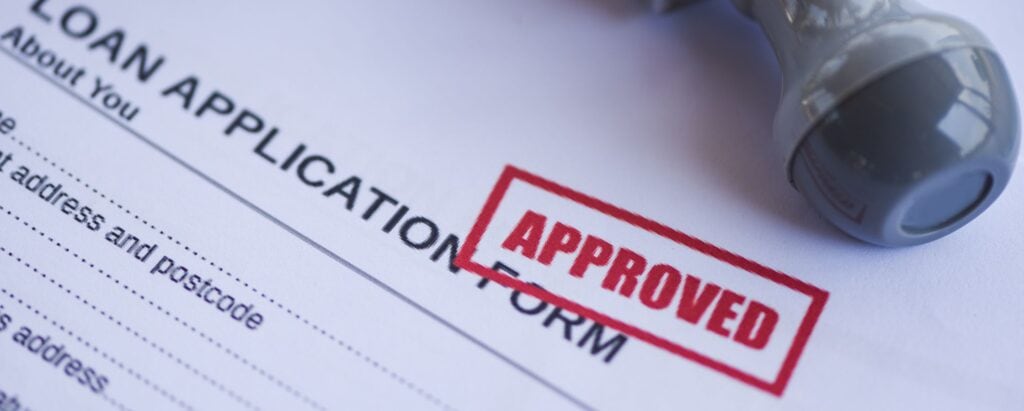Disclosure: This post may contain affiliate links. If you click on a link I may make a small commission at no extra cost to you. You can read the full disclosure here.
Last Updated on February 4, 2024 by Alex
Navigating the world of loan applications can be complex, but fear not – you can learn everything you need to know about loan approvals right here.
In this article, you’ll learn about the loan approval process, including types of loans, key factors influencing approvals, and tips for a smoother experience. Whether you’re eyeing a personal loan, mortgage, or business funding, understanding the intricacies of bank loan approval can save you time and elevate your financial strategy.
Stay tuned for expert advice and actionable tips to enhance your chances of securing the loan you need. Your journey to financial empowerment starts here!
What are Loan Approvals

Loan approvals refer to the process by which a financial institution or lender evaluates a borrower’s creditworthiness and decides whether to grant them a loan. This process involves assessing various factors, including the borrower’s credit history, income, debt-to-income ratio, employment stability, and other relevant financial information.
It’s important to note that loan approval criteria may vary between lenders and loan types. Different types of loans, such as personal loans, mortgages, or business loans, may have specific requirements tailored to their respective purposes. Additionally, the interest rates and terms offered can vary based on the borrower’s creditworthiness and the lender’s policies.
How Does Loan Approval Work

Loan approval involves a systematic process through which lenders assess the creditworthiness of a borrower and decide whether to approve or deny a loan application. Here’s a general overview of how the loan approval process works.
Loan Application
Borrowers initiate the process by submitting a loan application to a lender. The application includes personal information, financial details, the purpose of the loan, and the requested loan amount.
Background Checks
Lenders typically conduct a credit check to evaluate the borrower’s credit history. This involves obtaining the borrower’s credit score and reviewing their credit report to assess their past credit behavior. Having good credit or bad credit will determine what loan options you’re offered.
At this stage a lender may also verify a borrower’s income, debt-to-income ratio, and employment status.
If the loan is secured by collateral, such as real estate or a vehicle, lenders may conduct an appraisal to determine the value of the collateral.
Decision
Based on the information gathered, the lender decides to approve or deny the loan. If approved, the lender provides the borrower with a formal loan offer that details the terms and conditions.
Acceptance and Closing
If the borrower accepts the loan offer, they move to the closing stage. During closing, legal documents are signed, and the loan funds are disbursed.
Repayment
After the loan is approved and disbursed, the borrower is responsible for making regular payments according to the agreed-upon terms.
Steps of the Loan Approval Process

The loan approval process involves several steps, each designed to assess the borrower’s creditworthiness and determine whether to grant the loan. While specific steps can vary between lenders and loan types, here’s a general outline of the typical loan approval process.
Loan Application
Borrowers initiate the process by submitting a loan application. This application includes personal information, details about the purpose of the loan, the requested loan amount, and other relevant financial information.
Looking at Your Credit Score
Lenders conduct a credit check to assess the borrower’s creditworthiness. This involves obtaining the borrower’s credit score and reviewing their credit report to evaluate their credit history.
Pre-Approval
Some lenders offer pre-qualification to give borrowers an estimate of the loan amount and terms they might qualify for. Pre-qualification is often a quick process and doesn’t guarantee loan approval.
Income Verification
Lenders verify the borrower’s income to ensure they have the financial capacity to repay the loan. This may involve checking pay stubs, tax returns, or other financial documents.
Debt-to-Income Ratio Analysis
Lenders calculate the borrower’s debt-to-income ratio by comparing their monthly debt payments to their gross monthly income. A lower ratio is generally favorable for loan approval.
Employment Verification
Lenders may verify the borrower’s employment status and stability to assess their ability to make consistent loan payments.
Appraisal and Collateral Evaluation (for Secured Loans)
If the loan is secured by collateral, such as real estate or a vehicle, lenders may conduct an appraisal to determine the value of the collateral. This step helps assess the loan-to-value ratio.
Loan Terms Offer
Based on the information gathered, the lender provides the borrower with a formal loan offer. This offer includes the minimum loan amount, interest rate, repayment period, and any fees associated with the loan.
Acceptance by Borrower
If the borrower agrees to the terms outlined in the loan offer, they formally accept the loan. This acceptance is typically communicated to the lender through a signed agreement.
Underwriting
The lender’s underwriting team thoroughly reviews the borrower’s application and supporting documentation to ensure it meets the institution’s criteria.
Approval or Denial
The lender makes a final decision to approve or deny the loan based on the information gathered during the application and underwriting process.
Closing
If the loan is approved, the borrower proceeds to the closing stage. During closing, legal documents are signed, and the loan funds are disbursed.
Repayment
After closing, the borrower is responsible for making regular payments according to the agreed-upon terms.
Types of Loan Approvals

Loan approvals can be categorized based on various factors, including the purpose of the loan, the borrower’s credit profile, and the loan structure. Here are some common types of loan approvals.
Unsecured Personal Loan
Unsecured loans are granted for personal use, such as debt consolidation, home improvements, or medical expenses. Approval is typically based on the borrower’s creditworthiness.
Mortgage Loan Approvals
Loans specifically for purchasing or refinancing real estate. Mortgage approvals consider factors such as credit history, income, employment stability, and the property’s value.
Auto Loans
Loans used to finance the purchase of a vehicle. Approval depends on the borrower’s credit score, income, and the value of the vehicle.
Student Loans
Loans designed to help students cover education-related expenses. Federal student loans often have more lenient approval criteria compared to private student loans.
Business Loans
Loans provided to businesses for various purposes, including working capital, expansion, or equipment purchases. Business loan approvals may consider the company’s financial health, business plan, and creditworthiness.
Secured Loans
Loans that are secured by collateral, such as real estate, vehicles, or savings accounts. The collateral reduces the lender’s risk, making approval more likely.
Unsecured Loans
Loans not backed by collateral, relying solely on the borrower’s creditworthiness. Personal loans and credit cards are common examples of an unsecured loan.
Fixed-Rate Loan Approvals
Loans with a fixed interest rate throughout the loan term. Borrowers are approved based on their ability to make a fixed monthly payment.
Variable-Rate Loan Approvals
Loans with an interest rate that can change over time based on market conditions. Borrowers are approved based on their ability to handle potential interest rate fluctuations.
Refinance Loan Approvals
Loans used to replace an existing loan with a new one, often to secure better terms, lower interest rates, or change the loan structure.
Credit Card Approvals
Approval for a revolving line of credit with a good credit card. Factors considered include credit score, income, and debt-to-income ratio.
Payday Loans
Short-term, high-interest loans that are typically due on the borrower’s next payday. Approval is often based on the borrower’s income and employment status.
How To Get Approved for a Loan

Getting approved for a loan involves demonstrating to the lender that you are a reliable borrower who can repay the borrowed funds. Here are some general steps and tips to improve your chances of getting approved for a loan.
Check and Improve Your Credit Score
Obtain a copy of your credit report and check your credit score. A higher credit score generally increases your chances of loan approval. If your score is low, consider taking steps to improve it, such as paying down existing debts and addressing any errors on your credit report.
Understand Your Financial Situation
Assess your current financial situation, including your income, expenses, and outstanding debts. Lenders want to ensure that you have the financial capacity to repay the loan.
Determine the Loan Amount and Purpose
Clearly define the purpose of the loan and the specific amount you need. Having a well-defined purpose helps lenders understand how you plan to use the funds.
Choose the Right Type of Loan
Select a loan type that aligns with your needs. Different loans have different approval criteria, so choose the one that best fits your financial situation and the purpose of the loan.
Shop Around for Lenders
Explore loan options from different lenders, including banks, credit unions, online lenders, and peer-to-peer lending platforms. Compare interest rates, terms, and fees to find the best offer.
Gather Necessary Documentation
Prepare the required documentation, such as proof of income, employment verification, tax returns, and any other documents requested by the lender. Having these documents ready can expedite the approval process.
Improve Debt-to-Income Ratio
Lenders often consider your debt-to-income ratio, which is the ratio of your monthly debt payments to your gross income. Lowering your existing debts or increasing your income can improve this ratio and enhance your loan eligibility.
Consider a Co-Signer
If your credit is not strong enough, you may consider having a co-signer with better credit. A co-signer is someone who agrees to be responsible for the loan if you fail to repay it.
Offer Collateral (for Secured Loans)
If you are applying for a secured loan, such as a home equity loan or a secured personal loan, be prepared to offer collateral. Collateral can reduce the risk for the lender and increase your chances of approval.
Demonstrate Stability
Lenders value stability. If you have a stable job, residence, and financial history, it can positively impact your loan approval chances.
Review and Understand the Terms
Before accepting any loan offer, carefully review the terms, including the personal loan rate, repayment term, and any fees. Make sure you understand the terms and are comfortable with them.
Here are some common loan approvals FAQs.
What are the easiest loans to get approved for?
The ease of getting approved for a loan can depend on various factors, including your credit history, income, and the type of loan you’re applying for. While there’s no one-size-fits-all answer, some types of loans are generally considered easier to obtain credit approval for, especially for individuals with average or poor credit scores.
Some of the easiest loans to get approved for include a payday loan, title loans, pawn shop loans, credit builder loans, Peer-to-Peer (P2P) loans, and loans from family or friends.
How long does the loan approval process take?
The duration of the loan approval process can vary widely depending on several factors, including the type of loan, the lender’s policies, and the complexity of your financial situation.
If you need a loan quickly, it’s advisable to inquire about the expected timeline with the specific lender you are considering. Some lenders may offer expedited or same-day approval processes for certain types of loans.
Which lenders could I consider?
There are many lenders available depending on the type of loan you’re looking for. Lenders you could check out include SoFi Personal Loan, Happy Money, OneMain Financial, Alliant Credit Union, and the Navy Federal Credit Union.







